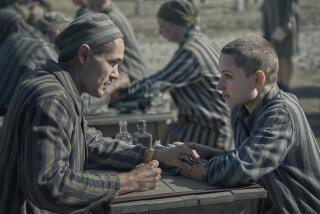PASSINGS: Wilhelm Brasse

Notable deaths of 2012 (Ron Frehm / Associated Press)

Notable deaths of 2012 (David Longstreath / Associated Press)

Notable deaths of 2012 (Chris Pizzello / Associated Press)

Notable deaths of 2012 (John Duricka / Associated Press)

Notable deaths of 2012 (Lucy Pemoni / Associated Press)

Notable deaths of 2012 (Don Bartletti / Los Angeles Times)

Notable deaths of 2012 (Victoria Will / Associated Press)

Notable deaths of 2012 (Andre Luiz / Associated Press)

Notable deaths of 2012 (Ron Edmonds / Associated Press)

Notable deaths of 2012 (Tony Gutierrez / Associated Press)

Notable deaths of 2012 (Charles Rex Abrogast / Associated Press)

Notable deaths of 2012 (Jennifer S. Altman / For The Times)

Notable deaths of 2012 (Genaro Molina / Los Angeles Times)

Notable deaths of 2012 (Elizabeth Conley / Associated Press)

Notable deaths of 2012 (Eric Gay / Associated Press)

Notable deaths of 2012 (Jim Mone / Associated Press)

Notable deaths of 2012 (Walt Zeboski / Associated Press)

Notable deaths of 2012 (David Van Der Veen / AFP / Getty Images)

Notable deaths of 2012 (Matthew Cavanaugh / EPA)

Notable deaths of 2012 (Ray Howard / Associated Press)

With his silky voice and and casual style, the baritone most famous for his rendition of “Moon River” was one of America’s top vocalists from the 1950s into the 1970s. He was 84. Full obituary
Notable deaths of 2012

Notable deaths of 2012 (Carlo Allegri / Associated Press)

Notable deaths of 2012 (John Marshall Mantel / Associated Press)

Notable deaths of 2012 (Gary Friedman / Los Angeles Times)

Notable deaths of 2012 (Gus Ruelas / Associated Press)

Notable deaths of 2012 (Santi Visalli / Getty Images)

Notable deaths of 2012 (Ken Hively / Los Angeles Times)

Notable deaths of 2012 (Carolyn Cole / Los Angeles Times)

Notable deaths of 2012 (Genaro Molina / Los Angeles Times)

Notable deaths of 2012 (Jim Hollander / EPA)

Notable deaths of 2012 (Charles Sykes / Associated Press)

Notable deaths of 2012 (Bebeto Matthews / Associated Press)

Notable deaths of 2012 (Jay L. Clendenin / Los Angeles Times)

Notable deaths of 2012 (George Wilhelm / Los Angeles Times)

Notable deaths of 2012 (Diether Endlicher / Associated Press)

Notable deaths of 2012 (Hassan Ammar / Associated Press)

Notable deaths of 2012 (Ed Rode / Associated Press)

Notable deaths of 2012 (Nati Harnik / Associated Press)

Notable deaths of 2012 (Alexander Joe / AFP / Getty Images)

Notable deaths of 2012 (Olivier Ferrand / Capitol Records)

Notable deaths of 2012 (Gary Friedman / Los Angeles Times)

Notable deaths of 2012 (Jakub Mosur / For The Times)

Notable deaths of 2011 (Frazer Harrison / Getty Images)

Notable deaths of 2011 (Al Messerschmidt / Getty Images)

Notable deaths of 2011 (Jae C. Hong / Associated Press)
Wilhelm Brasse, 95, a former Auschwitz prisoner who survived the camp after the Nazis discovered he was a professional photographer and put him to work taking pictures of other prisoners, has died. A spokesman at the Auschwitz-Birkenau state museum, Jaroslaw Mensfelt, said Brasse died Tuesday in Zywiec, a town in southern Poland.
Brasse, who was born in 1917 and was not Jewish, was sent to Auschwitz at 22 as a political prisoner for trying to sneak out of German-occupied Poland in the spring of 1940. Because he had worked before World War II in a photography studio in southern Poland, he was put to work in the camp’s photography and identification department.
It was an emotionally devastating task that tormented him long after his liberation. The images made by Brasse, one of several photographers pressed into service, are haunting: naked and emaciated children at Auschwitz standing shoulder-to-shoulder, adult prisoners in striped garb posing for police-style mug shots.
The job helped to save his life, enabling him to get better treatment and food than many others. After the war, he had nightmares for years of the Nazi victims he was forced to photograph. Among them were emaciated Jewish girls who were about to undergo cruel medical experiments under the infamous Dr. Josef Mengele.
“I didn’t return to my profession, because those Jewish kids, and the naked Jewish girls, constantly flashed before my eyes,” he said in a 2006 interview with the Associated Press. “Even more so because I knew that later, after taking their pictures, they would just go to the gas.”
Brasse said he believed he took about 40,000 to 50,000 of the identity photographs that the Nazis used to register their prisoners — part of the Nazi obsession with documenting their work. These pictures are among some of the notorious images associated with the camp.
At the war’s end, with the Soviet army about to liberate Auschwitz, the Germans ordered the photos destroyed, but Brasse and others refused the order and managed to save thousands of them.
— Times staff and wire reports
More to Read
Start your day right
Sign up for Essential California for the L.A. Times biggest news, features and recommendations in your inbox six days a week.
You may occasionally receive promotional content from the Los Angeles Times.







